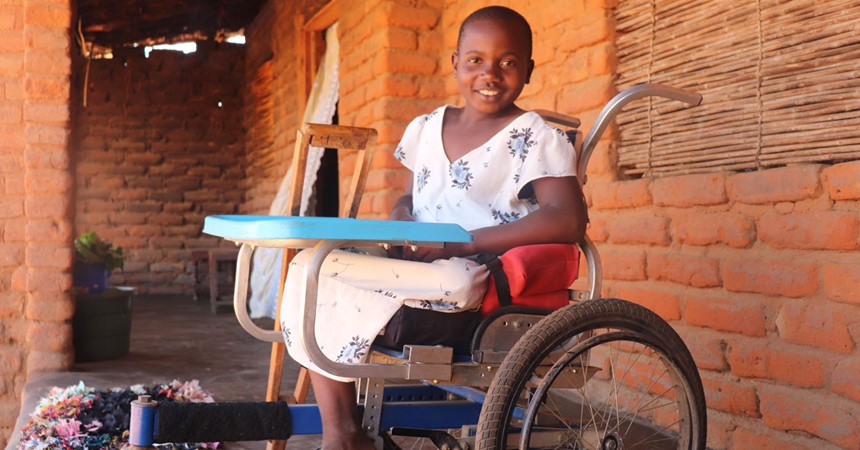For most of her life, her parents have struggled to put meals on the table. Tawonga often had to miss school because she was too sick from hunger. The family also faced discrimination in their community due to her disability.
Since participating in a Caritas Australia supported program, Tawonga’s life has transformed. Her family now grows enough food to provide three meals a day, ending the struggle of malnutrition, and helping her thrive at school. The programs have also helped spread greater acceptance of her disability and with her community’s support, Tawonga has the confidence to pursue her dreams.
Tawonga lives in the Rumphi district of Malawi. She is the youngest of six children and was born with one weaker leg, so she walks with the aid of crutches. Her siblings used to push her three kilometres to school in a donated wheelchair.
Tawonga, whose name means ‘thank you’, says her community is blessed with many resources, like rivers, fertile soil and hills. However, with dry spells followed by floods, armyworm infestations and crop failures, her parents struggled to make a living.
“If we harvest less maize, we do not have enough food to last our family for the whole year,” said Tawonga’s father, Simon.
Although Malawi’s food security has improved, in a country of 19 million people, 6 million still need food aid.
The family cut back on their meals, sometimes going without food for four days and they were excluded from food distributions, as community members favoured more vocal and better-connected households.
“People living with disabilities were not regarded as important and they thought they did not deserve such things,” Tawonga’s mother, Agnes says. “We were considered as people who cannot contribute anything to the development of the community.”
Tawonga was often sick due to hunger, a lack of safe drinking water and poor sanitation.
“Sometimes we had one meal per day. And when we are hungry, we do not attend classes,” Tawonga says.
Her parents also found it difficult to afford school fees. Sadly, when she did make it to school, other students would insult her about her disability.
An estimated 2.4% of youth in Malawi are living with a disability, and around 90% of them are in rural areas. School attendance is much lower for people living with a disability like Tawonga, mostly because schools aren’t equipped to meet their needs.
In 2016, Tawonga’s parents heard about the A+ program, run by Caritas Australia’s partner, CADECOM (Catholic Development Commission in Malawi). They learnt irrigation farming and were given fertiliser and high-yield seeds. With these new techniques, their production of crops almost tripled.
As part of the program, the community also learnt how to better support people living with disabilities. Through the reduction of stigma and discrimination a new culture of acceptance and collaboration flourished. Tawonga’s community banded together to develop a seed bank and dug boreholes to enable access to safe water at shorter distances. This led to a reduction in waterborne diseases.
Tawonga’s parents are now able to harvest twice a year. Her mother joined the village savings and loans group and was able to start a small business, selling fish, rice and vegetables. Now they can eat three meals a day. They can also afford to send Tawonga to a school with a live-in campus and disability-friendly facilities, for a better education.
“Tawonga is a very positive person and very enthusiastic,” says Anita Mahata, CADECOM’s Project Director. “She is now able to interact with her friends and is now going to school daily.”
Tawonga works hard and dreams of becoming a nurse when she grows up, so she can help people in her community. Thanks to the program, she now feels like part of her community, which gives her the confidence to reach for her goals.
“It gives me hope that I will finish my education,” Tawonga says. “My community now understands that my living with a disability is not inability. Although I sometimes face discrimination, most of the community has realised my value as a person.”
“I would like to thank the people of Australia for their support they provide to my community. Your support has brought a positive change in my family and community.”
With your help, this transformational program can continue to empower vulnerable women, men and children, and strengthen the communities around them. Please donate generously today. A brighter future for women, men and their families can start today. Let’s Go Further, Together.
*MVAC
*Unicef 2013

